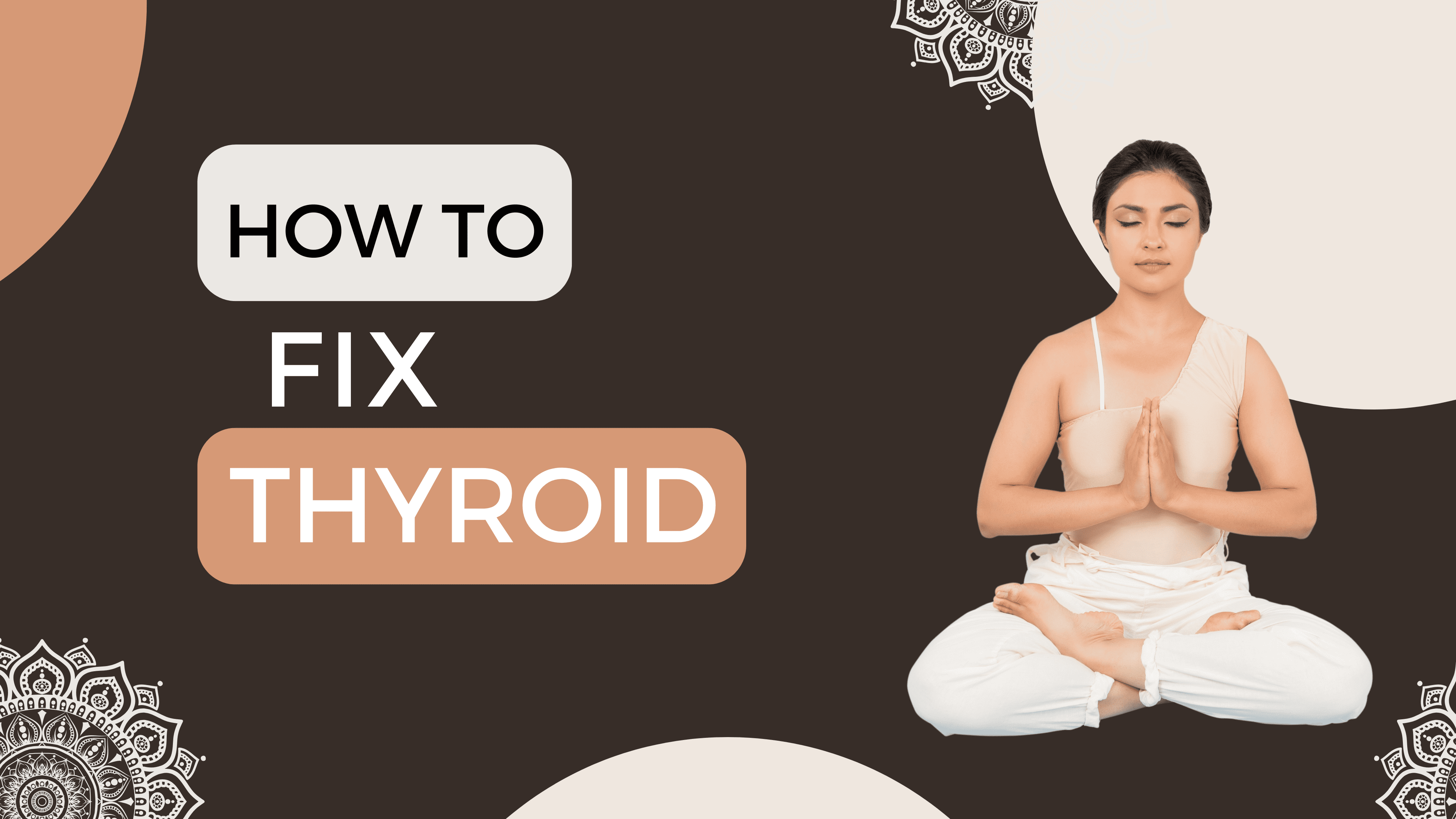The thyroid is a butterfly-shaped gland in your neck It is responsible for managing our metabolic activities. Sometimes, it makes too much or too little of a hormone, which can mess with how our body uses energy. Because of changes in our lifestyle, thyroid problems are common today. In this article, we’ll discuss How to fix thyroid issues using natural and holistic approaches.
Table of Contents
Understanding Thyroid Issues
The thyroid gland is a small, important organ in your neck. Its job is to produce hormones called T3 and T4. These hormones are like messengers that control how your body uses energy.
How Issues Arise:
Sometimes, the thyroid gland doesn’t work as it should. It might slow down and not produce enough hormones (hypothyroidism). it might speed up and produce too many hormones (hyperthyroidism).
We can say, sometimes your thyroid gland doesn’t work as it should. It can mess with the balance of hormones in your body, affecting how fast or slow things happen. This imbalance can cause different health issues depending on whether your thyroid is too slow (hypothyroidism) or too fast (hyperthyroidism). In severe cases, it can lead to thyroid cancer as well.
Hypothyroidism (Underactive Thyroid):
Hypothyroidism occurs when the thyroid gland fails to produce sufficient hormones, particularly thyroxine (T4). Symptoms of hypothyroidism include persistent fatigue, unexplained weight gain, and heightened sensitivity to cold. Hashimoto’s thyroiditis disease, an autoimmune condition where the immune system attacks the thyroid, often underlies hypothyroidism.
Hyperthyroidism (Overactive Thyroid):
In hyperthyroidism, the thyroid gland goes into overdrive, producing an excess of hormones, particularly thyroxine (T4). This hormonal in excess can lead to a range of symptoms, including sudden weight loss, increased heart rate, and high sensitivity to heat. Grave’s disease, an autoimmune disorder, is a common cause, where the immune system stimulates excessive thyroid hormone production.
How to fix thyroid problems through diet and nutrition?
Nutrition has a huge impact on the functioning of your thyroid gland. As in order to produce the hormones, nutrients like iodine, selenium and vitamins act as raw materials. But make sure the supply of these raw materials is neither too less nor too high.
Here’s a chart explaining the role of different nutrients in thyroid gland functioning.
| Nutrient | Role | Impact | Food Sources | Daily Recommended Dose |
| Iodine | Essential for thyroid hormone production | Too little can slow thyroid function | Iodized salt, seaweed, dairy, | 150 micrograms for adults |
| L-tyrosine | Aids in thyroid hormone synthesis | Needed for hormone creation | Dairy, nuts, seeds, legumes, whole grains | No specific daily recommendation; included in a balanced diet |
| Selenium | Supports thyroid hormone activity | Important for thyroid function | Nuts (especially Brazil nuts), seeds, whole grains | 55 micrograms for adults |
| Vitamins | Essential for overall thyroid health | Vitamin D is crucial | Sunlight, eggs, fruits, veggies, whole grains | 600 IU for adults |
Mediterranean Diet for Thyroid
Research has highlighted that a Mediterranean diet can be beneficial for the smooth functioning of the thyroid gland. A Mediterranean diet is rich in fruits, vegetables, whole grains, lean proteins, and healthy fats can help in thyroid disease. It can positively influence the smooth functioning of the thyroid gland. The balanced combination of nutrients in this diet is associated with improved thyroid health and overall well-being.
Gluten and Molecular Mimicry
For some people with thyroid issues, especially those with diseases like Hashimoto’s, gluten might be worth looking into. Gluten, found in wheat and similar grains, has a structure similar to thyroid tissue. In some cases, the body might get confused and attack the thyroid after eating gluten. This is called molecular mimicry.
How to Fix Thyroid Problems through Lifestyle Changes?
1. Exercise:
Thyroid is often accompanied by drastic changes in weight, hence weight management becomes very important. In that case regular physical activity can benefit thyroid health immensely. Exercise helps in boosting metabolism and supporting weight management. You can opt for activities like brisk walking, cycling, or yoga .
2. Sleep:
Sleep and thyroid have a connection that goes in both directions. Unhealthy sleeping patterns can cause thyroid imbalance while thyroid can lead to sleep disturbances. Aim for at least 7-9 hours of sleep per night to support your body’s recovery and promote optimal thyroid health.
3. Stress Management:
Stress can negatively impact thyroid function and vice versa. Stress management techniques, such as deep breathing, pranayama, meditation, and mindfulness, can help reduce stress levels. To tackle thyroid holistically it is important to pay attention to your mental health and stress levels. You can check out this article by Yuvaap, where they have shared 4 pranayama techniques for thyroid health.
Alternative Therapies For Thyroid Problems
Apart from holistic approach, there are some alternative therapies that one can opt for thyroid problems. But it is very necessary to keep in mind that these therapies can be very subjective. So, it is essential to consult healthcare professionals before opting for these practices.
Fixing Thyroid Problems with Acupuncture:
Acupuncture is a traditional Chinese medicine practice. It includes inserting thin needles into specific points of your body. Some people believe that it can help in balancing the energy flow and supporting thyroid function.
While some studies suggest its potential benefits, more research is needed in this field. If considering acupuncture, please consult with a healthcare professional to ensure it complements your overall thyroid treatment plan.
Fixing Thyroid Problems with Essential Oils:
Essential oils, like lavender or frankincense, are extracted from plants and thought by some to have therapeutic properties. While there’s limited scientific evidence regarding essential oils directly fixing thyroid problems, black seed essential oil has shown some promising effects. It’s essential to view essential oils as complementary rather than primary treatments. Always consult with a healthcare professional before using essential oils, especially if you have thyroid concerns.
Conclusion
To sum up, fixing thyroid issues involves a holistic approach. Pay attention to your diet, focusing on nutrients like iodine and vitamins. Consider the Mediterranean diet for its positive impact. Embrace lifestyle changes, including exercise, healthy diet, good sleep, and stress management.
Alternative therapies like acupuncture and essential oils, especially black seed essential oil, might help but consult a healthcare professional before trying them. Remember, a balanced and personalised approach is key to managing thyroid problems effectively.
FAQs
1. How do I get my thyroid back to normal?
Ans. To return your thyroid to normal, focus on a balanced diet with nutrients like iodine, exercise regularly, get adequate sleep, and manage stress. It’s crucial to consult with a healthcare professional for personalised guidance.
2. Which foods can I avoid for thyroid?
Ans. Limit processed foods, soy, and excessive iodine in your diet. Seek advice from a doctor or a nutritionist for personalised dietary recommendations based on your thyroid condition.
3. Can you live with thyroid problems?
Ans. Yes, many individuals lead normal lives with thyroid problems. Be it people with hypothyroidism or hypothyroidism, proper medical care, prescribed medications, and lifestyle adjustments can effectively manage thyroid issues.
4. What drink helps thyroid?
Ans. Stay hydrated with water as a primary choice. Herbal teas like green tea or chamomile may offer additional benefits. For personalised advice on thyroid health, consult with a healthcare professional.










